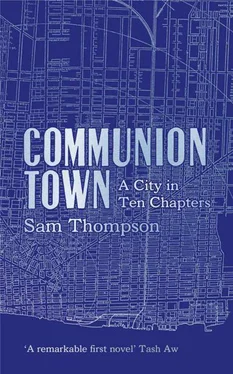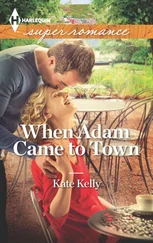‘Well, I’m going out. What’s there to see, I intend to see it with my own eyes. Whatever I meet out there, I’m going to shake it by the hand and listen carefully to what it has to say. I have a few questions to ask it.’
He looked pleased with this statement. We blinked and swallowed, and examined our empty glasses. One of the man’s friends murmured something. Another said, ‘Henry,’ and laid a hand on his arm, but he shook it off.
‘It’s nothing to be afraid of,’ he said.
We looked at each other, Briggs, Baggott and me. Eventually I cleared my throat and spoke up. ‘You can’t be going out there,’ I said.
The man stared at me, hard-eyed, then strode over, caught my hand and squeezed it.
‘My friend, your kind concern is noted. What I’m going to do is this. I’m going to walk out of that door and take a brisk stroll. Then at dawn my associates here will take me out for a slap-up breakfast, and I will regale them with the story of a pleasant night’s walk in the city and, I fully expect, an unusual adventure and an illuminating conversation.’
I would have tried again, but I had heard a feeble note in my voice, and I faltered. Baggott took over, sounding irritated with the whole lot of us. ‘You go out there, it’ll find you,’ he said, as if this were too plain to need saying.
‘With respect, friends,’ the young man said, ‘and much as I appreciate your advice, I prefer to see for myself.’ He stifled a belch. ‘Besides, haven’t I given my word to these gentlemen?’
His friends seemed to cast around for an answer. They didn’t find it, although one of them gave a dry laugh.
The curly-haired man pulled on a woollen watch cap, nodded to us, and opened the street door. Outside, it seemed to me, a congregation of disused premises leaned inwards in anticipation, leering down with their broken and boarded windows. He paused, turning up the collar of his jacket, and looked back at us.
‘Fine night,’ he said. ‘No one join me? No?’
He stepped out and the door moaned shut behind him. Through the window we saw him turn the corner of Halfmoon Street, heading towards the front of the station, his figure bobbing into the hem of a huge brown darkness.
It was time to get our glasses filled, but Dilks was busy scrubbing at something in his sink. The breath of cold air that had entered by the door dissipated, and the café grew tolerably warm again. We grew silent. The men at the other table had run out of conversation, too. Eventually one of them leant over to us.
‘We tried to talk him out of it,’ he said. His plump face was blotched pink and white. ‘We never encouraged him. But once he gets an idea in his head he won’t listen to anyone. We thought it was better than letting him go alone.’
We had no answer to that, but it was clear that now the newcomers wanted a parley. Baggott grumbled under his breath, but the pink-cheeked man grabbed the whiskey bottle and emptied the last of it into our glasses as he and his friend drew their chairs in closer.
‘I would have gone with him,’ he said, and paused uncomfortably. His eyes darted around, wanting our help. Then he shrugged and trailed off.
The electric fire glowed orange in the brown gloom, and with the whiskey in my gut it felt warm in here tonight. The wet smell of the carpet was in my nostrils. Baggott picked at his thumbnail. Briggs hawked and spat into his handkerchief. Dilks now stood with his gaze fixed on a curl of wallpaper that had, at some period in the past, peeled down to rest on the bartop.
The five of us were sitting in a circle around the table, our faces and hands hanging at the grubby edges of the pool of light. The rain had stopped, but rainwater still pattered into the floor. Above our heads the rest of the building was vacant. Briggs touched his pockets, then got up and crossed the dim space to the counter. He returned to his seat with two cigarettes, laid one on the table in front of him, and lit up the other. There was a silence. He sucked on his cigarette, held the smoke in his chest, then allowed it to overflow gently and roll in a bib down his front.
‘You want to know what happens when you stay out after dark?’ he asked. He leant forward and indicated Dilks with a guarded tilt of his head. The barman, who was ponderously counting pennies into his money box, showed no sign of interest in our talk.
‘He did it, once,’ Briggs said. ‘He never meant to, but he did. I’ll tell you what happened.
‘At the time, the café was nearly ready for its grand opening. The outside was freshly scrubbed and painted, very pretty. No one had seen the likes of it around here before, but Dilks was convinced this side of town was on the up and his establishment was going to be at the heart of it. To begin with I’d thought it was a foolish notion that would never work, but he was such a persuasive man in those days, such a man of energy and ideas, that I’d started to think he was going to prove me wrong. Whenever you spoke to him you felt you were living in exciting times, at the heart of it all, with good days to come. You came away wanting to work hard at some worthy project.
‘Of course, around here people kept to themselves, and they didn’t stay out after dark on those nights. But Dilks didn’t have any truck with that. He said it was nonsense. He said the district needed a place where we could all go for food and drink and warmth and fellowship. It’d be an inn where travellers could rest safely, he said, and a friendly hostel for tourists, it’d be a salon for talk and singing, and a tavern where locals would gather at the end of the working day; a feasting-hall, even, where every citizen would be welcome. When he talked about it like that, you believed him. You believed he and Poppy could make it happen.
‘They’d married that summer, Dilks and Poppy, and since then they’d been juggling the thousand tasks that come with starting a business — but, he used to say with a rueful grin, they hadn’t murdered each other yet. It had seemed impossible at first, conjuring a going concern out of a run-down building on this side of town, but each day they worked their plans nearer to realisation. They were up before dawn every morning. He was full of ideas, but she was the one with a head for figures. Together they’d done the research, put their plan together and got the investments they needed. Most nights they stayed up into the small hours working on the numbers at their kitchen table.
‘They were renting an attic room over in Three Liberties, a cramped, tiny place, with their bed in one corner and laundry strung up all around, chimney pots and slates right outside the window and the milk standing out on the sill. When I visited once, she joked about how she wasn’t going to fit in here for much longer. The child was just starting to show. Still, they’d only be there until the business got under way. I’m not one for family life, but when I visited the pair of them together I thought I could see the point.
‘And now the opening was in sight. Sometimes they felt the whole undertaking was like a ship held together by willpower alone, hurtling down the slipway while it was still full of leaks to be plugged, but now they glimpsed the day, not too far off, when it would float on even waters and they could navigate into the future. They’d cleared the planning permissions, bought licences for liquor and music and every kind of insurance, met all the regulations on safety and environmental health. The refurbishments were coming along nicely. Soon it’d be time to hire staff. Only the day before, Dilks had put up the sign with the name they’d chosen: The Rose Tree Café.
‘That night, he was working late on the premises, finishing off the paint job in the saloon. He’d intended to be home hours ago, but he and Poppy were used to these long days and late nights by now. They kept promising each other it wouldn’t be for much longer. He cleared up his night’s work, and briefly considered sleeping on one of the brand-new sofas in the lobby. The last metro had gone hours ago and he knew this was not the season to wander after dark. But he’d told Poppy he’d be home, and after all, he decided, it was only a half-hour’s walk across town. So he locked up the café and set out.
Читать дальше
Конец ознакомительного отрывка
Купить книгу












